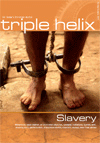NICE guidance
Jeffrey Stephenson, a consultant in palliative medicine in Devon, qualifies Adrian Treloar's challenge to NICE guidance about prescribing for Alzheimer's.
I agree with Adrian Treloar (Triple Helix 2007; Winter: 5) that, when faced with difficult decisions, we must remember our vocation and that the patient is our first concern. However, the patient before us cannot be our only concern, since we have responsibilities to other patients and to society. After all, that is a major argument we use against assisted dying in a society that increasingly rejects Christian values.
We cannot escape the fact that the treatment or care we provide for a given patient carries with it an opportunity cost, in that those resources are no longer available to other patients with different needs. We operate within a healthcare system with finite resources, and we simply can't go on expecting that every new and ever-increasingly expensive treatment can be made available to everyone who could possibly benefit. Some sort of cost benefit analysis has to be made if we are to preserve the essence of the NHS philosophy of care for everyone that is 'free' at the point of access. The alternative is that patients receive only those treatments that they or their insurance can pay for – which is surely a much more inequitable system.
As individual practitioners, of course we will be vocal advocates for our own patients, but the harder we push for our share of the 'pot' the less there will be for other specialties. Cost benefit analyses are very difficult to perform, but someone has to make assessments to guide decision making, and NICE has been charged with that task. It is an imperfect body, and will make mistakes, but it should be supported and respected in the difficult job it does.
Sometimes the best care or treatment option available may not be feasible for our patients for any number of reasons, including economics. I face such issues every week in decisions over the transfer of terminally ill patients from hospice to nursing homes in order to release beds for other patients who need our specialist services. I have little experience in looking after those with dementia, and none in the use of anti-dementia drugs, and I would not presume to pass judgement on NICE's decisions in this area. I simply want to draw attention to other important principles.
God is our supreme authority, and clearly we must submit everything we do to him. Compassion, love and a concern for the weak and vulnerable are undoubtedly marks of Christian discipleship, but so also are good stewardship and submission under God to those in authority over us, even if we disagree with them (Romans 13: 1-2).
As Medical Superintendent of the International Nepal Fellowship's Green Pastures Leprosy and Rehabilitation Hospital, Iain Craighead agrees.
I want to respond to Adrian Treloar's article 'A nasty challenge from NICE'. I don't agree with his assertion that 'Effective treatment should be prescribed, even if a guideline … has told us not to'. It presupposes that managers make arbitrary decisions based on a whim, without thought to a patient's welfare, when in fact many health service managers are men and women of integrity who make decisions they believe to be correct based on the limited resources at their disposal.
If Dr Treloar had budgetary and managerial responsibility for a hospital I wonder if his attitude would change? I have managerial responsibility for a 73 bed leprosy and rehabilitation hospital. If I were to run the hospital on the basis described in his article, I could consume my annual budget within a few weeks, after which the hospital would have to close down.
Our Lord wants us to heal but he also wants us to be good stewards of the precious resources he has given us.
HPV vaccine
Andrew Tomkins, Professor at the Centre for International Health and Development at the Institute of Child Health, University College, London, argues the case for harm reduction.
Chris Richards (Triple Helix 2007; Winter: 21) brands HPV vaccine, condom promotion and clean needles as unethical. Having worked in child health in Africa for many years, I present an alternative view, based on painful awareness that we all live in a world where consensual decisions about when and where to have sex are frequently overcome by male demands.
Yet health professionals have a range of opportunities to prevent illness in women and children. 'Harm reduction' is a pragmatic term describing interventions that recognise, rather than ignore, the social and economic constraints that many people, especially the poor, live in. It is not a replacement for abstinence from extramarital sex or a denial of the need for behaviour change in a dug addict. It is not a perfect means of preventing transmission of HIV from a father to his innocent infant. 'Harm reduction' does however recognise the compassion that Jesus had on those suffering from their own behaviour or the behaviour of others.
In the description of Jesus meeting with the woman who was about to be stoned for adultery (John chapter 8), the crowd could have followed traditional ways of judging but they dropped their stones one by one as they were challenged to save rather than kill. In seeking a Scriptural way forward we need a considered theology of 'harm reduction' to guide us.
We have commissioned an article on the theology of harm reduction. In the meantime the print correspondence is closed, but members are encouraged to resume the debate in the Forum: www.cmf.org.uk






























